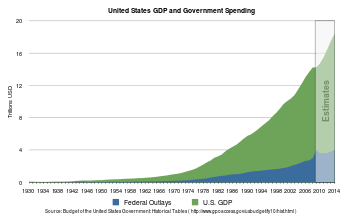The U.S. Budget and Compromises
 |
| English: A graph of the US GDP compared with Federal budget outlay. (Photo credit: Wikipedia) |
How much do citizens of the United States earn each year? A little more than $6 trillion. In other words, the U.S. government is spending roughly two-thirds of the amount earned by all working Americans. Two-thirds.
The top 10% of income earners represent $1 trillion in earnings, certainly a lot, equal to the entire stock valuation of Apple (not the same as Apple's earnings, which are $9 billion per quarter, $36 billion annually).
If every penny earned by the top 10% were confiscated it would have no material effect on the federal budget. That's how out of sync spending is today.
The total wealth in the United States is nearly $70 trillion, meaning everything owned by every person or company, at current "fair value" is worth $70 trillion. Yet, if you were to sell off things, they immediately lose that value so this is a complex and rough notion of how much we are worth as a nation.
Our annual economic activity is between $15 trillion and $17 trillion, with much of that in international transactions.
Are you wealthy or close to it and don't realize it?
The top 5% of households earn an annual income of $214,462 or higher, according to the Census Bureau. That's nearly four times the 2015 nationwide median household income of $56,516. Overall, this group lays claim to a 22.1% share of total household incomeThe top 5% earns 22.1% of all income. The "average" top 5% family has two college-educated adults in the house. Two college-educated people earning $108,000 each isn't that hard to imagine, is it?
Read more: How Much Income Puts You in the Top 1%, 5%, 10%? | Investopedia http://www.investopedia.com/news/how-much-income-puts-you-top-1-5-10/#ixzz4k4xH2I1Q
And yet, even if we had a 90% tax rate on the top 5% of households starting at $150,000, we would not balance the federal budget. Not even close. In fact, we'd be in deficit spending by August of each year.
https://www.nationalpriorities.orgWe have a spending problem, even if we increase taxes on the highest income earners. We need to talk about budget priorities, but we won't.
In fiscal year 2015, the federal budget was $3.8 trillion. These trillions of dollars make up about 21 percent of the U.S. economy (as measured by Gross Domestic Product, or GDP). It's also about $12,000 for every woman, man and child in the United States.
Congress allocated $1.11 trillion in discretionary spending in fiscal year 2015, meaning $2.69 trillion are pre-allocated and cannot be adjusted without revising non-discretionary social welfare programs. (And $230 billion went to servicing debts.)
From the IRS and the Congressional Budget Office for 2016
GDP: $16.5 trillion
Total Receipts: $2.99 trillion
Total Outlays: $3.54 trillion (down slightly from 2015)
Total Deficit as Percentage of GDP: -3.3%


Comments
Post a Comment